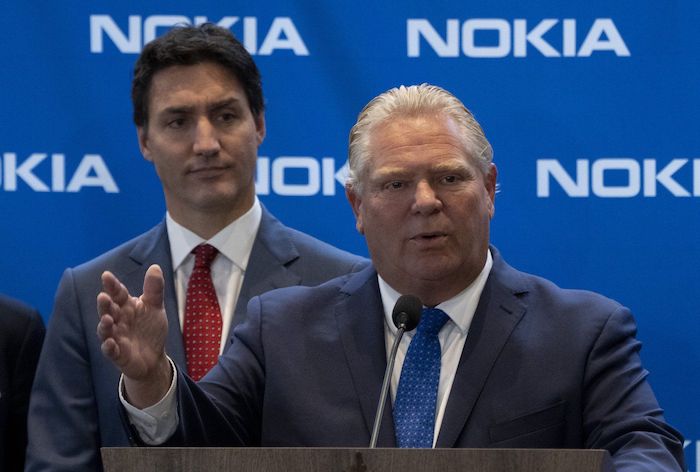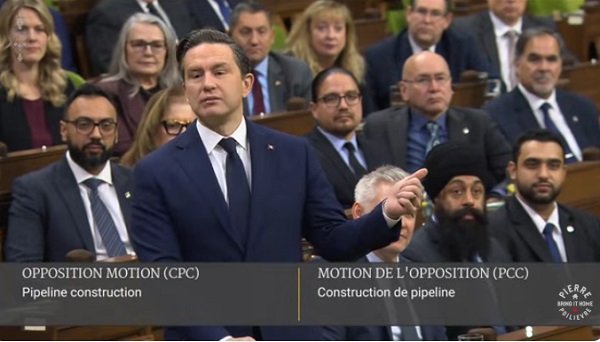National
Doug Ford is calling an election to save his political skin and Justin Trudeau’s government

Ford is the ultimate Red Tory, a faux conservative and faithful apologist for Trudeau
Ontario Premier Doug Ford has just called an election for two reasons: to keep himself in power and to keep the Liberal Party in charge of the Canadian government. Ford has been in the pocket of Prime Minister Justin Trudeau for so many years. He has been his constant political companion, especially during the Covid pandemic when Ford stood rigidly by Trudeau over lockdowns and mandates. When Trudeau invoked the Emergencies Act to flatten the Freedom Convoy, Ford was there all the time, not just approving of Trudeau’s decision but becoming an active cheerleader for the Liberal government.
Ford has done little to nothing for Pierre Poilievre and the Conservative Party of Canada because he’s not a Conservative or a small-c conservative. Ford is a “Progressive Conservative” or Red Tory who is indistinguishable from a Liberal. His party’s name is an oxymoron but Ford is just a moron who pretends to lead something called the Ford Nation, feigning some degree of populism, while all the while serving the same elites that Trudeau is in bed with.
Ford has done his utmost to convice us that the Liberals have a border security plan. They do not. Spending $1.3 billion on the border OVER SIX YEARS is not a plan, it’s a poor excuse for policly. And just look at how the Trudeau government preserves these woke programs even as it kicks the can of border security way down the road. But Ford, who seemed to be pretending that he had actually seen this “plan” tried to suggest that the Liberals had the situation well in hand.
“Minister [Dominic] LeBlanc laid out the plan. It’s a fabulous plan. Let’s get out there and tell the people of Canada they’ve worked hard on it. So what I said this morning after seeing the plan, it’s a solid plan, and it’s going to work,” he said, noting that Public Safety Minister David McGuinty was coordinating everything with all the relevant agencies and police forces.
“It’s a collective, collaborative group that are going to secure our borders. But the numbers that I have seen, it’s impressive, and the plan is impressive as well. Specifics about what this plan involves, I’ll leave that up to the federal government. I’ll leave, leave that up to Minister McGuinty to get out there and put the plan in front of the Canadian people. But it’s a solid plan,” Ford rambled on, adding that he had never even met McGuinty and “I wouldn’t know him if he walked through the door right now.”
The current tariff crisis with US President Donald Trump is all about Canada not securing its border and not doing anything to change that posture. Ford has been Trudeau’s echo since Trump first threatened to slap on the tariff, joined at the hip with him, supporting his Team Canada charade that is really Team Trudeau and welcoming a trade war with Trump. The Liberals, whether they go into the next election with Trudeau at the helm or not, don’t want to run against Poilievre and the Conservatives because they are 20 to 30 points behind in the polls. They want the next federal election to be against Trump because the only hope the Liberals have of winning is to pretend to be the party of Canada.
This works well for Ford as well. He can parade around as the politician who puts his country above self but that is precisely what he is not doing. Ford wants a provincial election now because there is some profoundly bad news in the offing for Ford and his corrupt government. Trudeau has co-opted Ford on his electric vehicle agenda that has squandered $52.5 billion in taxpayer money and ensured that the premier stood by his side every time he was announcing another EV manufacturing plant in the Ontario. The future of EVs looked pretty certain six months ago when the Green New Deal was ascendant in the US and it looked like the gas-powered vehicle was slated for the planned obsolescence of stupid government decrees and environmental extremism.
The Liberals, whether they go into the next election with Trudeau at the helm or not, don’t want to run against Poilievre and the Conservatives because they are 20 to 30 points behind in the polls. They want the next federal election to be against Trump because the only hope the Liberals have of winning is to pretend to be the party of Canada.
Not so today. Trump has changed all of that with the stroke of a pen, ending all EV mandates and removing any future sanctions of the internal combustion engine in an executive order. EVs are essentially finished for now and no one is buying them. There is no market for the cars being assembled in Windsor and St. Thomas. These plants are destined for failure. That’s why Ford has to move now, before the closures begin and before the unemployment begins. Ontario will also be facing an economic catastrophe from Trump’s 25 percent tariff and all of Ford’s bluster and BS will have done nothing to prevent it. If Ford does not seek reelection now, his chances of winning another mandate will be extremely low.
What really has Ford panicked is Trump’s talk about not needing to buy any cars made in Canada. That sounds like the dissolution of the Auto Pact that has been a mainstay of the Ontario economy for 60 years.
But of course, he is also helping Trudeau to avoid an early election and the Liberals could well campaign in the summer or fall as the anti-Trump party. The Conservatives could be almost irrelevant by that time if they can’t differentiate themselves from the Liberals and demand that voters go to the polls to elect a legitimate government that can negotiate with the US instead of remaining with a snide, insouciant prime minister who continues to ignore the border security that the Trump has insisted we deliver on while continuing to fire insults his way.
Currently, the only Canadian politician who is really working for Canada is Alberta Premier Danielle Smith, who is actively negotiating with Trump. Unfortunately, Trump apparently doesn’t even know that Poilievre exists and is continues to talk about hockey great Wayne Gretzky becoming the next prime minister. Poilievre needs to correct this misunderstanding immediately, start traveling with Smith to Washington if necessary. But he has to become a part of the process and stop letting Trudeau and Ford blather on about retaliatory tariffs and the punishment they think they are going to administer to the US.
Subscribe to Krayden’s Right with David Krayden
www.kraydensrightnews.com is a reader-supported publication. To receive new posts and to support my work, please consider becoming a paid subscriber. Resolve to Resist.
Business
Looks like the Liberals don’t support their own Pipeline MOU

From Pierre Poilievre
Alberta
They never wanted a pipeline! – Deputy Conservative Leader Melissa Lantsman

From Melissa Lantsman
Turns out the anti-development wing of the Liberal Party never stopped running the show.
Today, we’ll see if the Liberals vote for the pipeline they just finished bragging about.
Spoiler: they won’t. Because with the Liberals, the announcements are real, but the results never are.
-

 espionage1 day ago
espionage1 day agoWestern Campuses Help Build China’s Digital Dragnet With U.S. Tax Funds, Study Warns
-

 Bruce Dowbiggin1 day ago
Bruce Dowbiggin1 day agoWayne Gretzky’s Terrible, Awful Week.. And Soccer/ Football.
-

 Opinion2 days ago
Opinion2 days agoThe day the ‘King of rock ‘n’ roll saved the Arizona memorial
-

 Focal Points2 days ago
Focal Points2 days agoCommon Vaccines Linked to 38-50% Increased Risk of Dementia and Alzheimer’s
-

 Health1 day ago
Health1 day agoCDC Vaccine Panel Votes to End Universal Hep B Vaccine for Newborns
-

 Business1 day ago
Business1 day agoCanada invests $34 million in Chinese drones now considered to be ‘high security risks’
-

 Agriculture1 day ago
Agriculture1 day agoCanada’s air quality among the best in the world
-

 Business1 day ago
Business1 day agoThe EU Insists Its X Fine Isn’t About Censorship. Here’s Why It Is.















